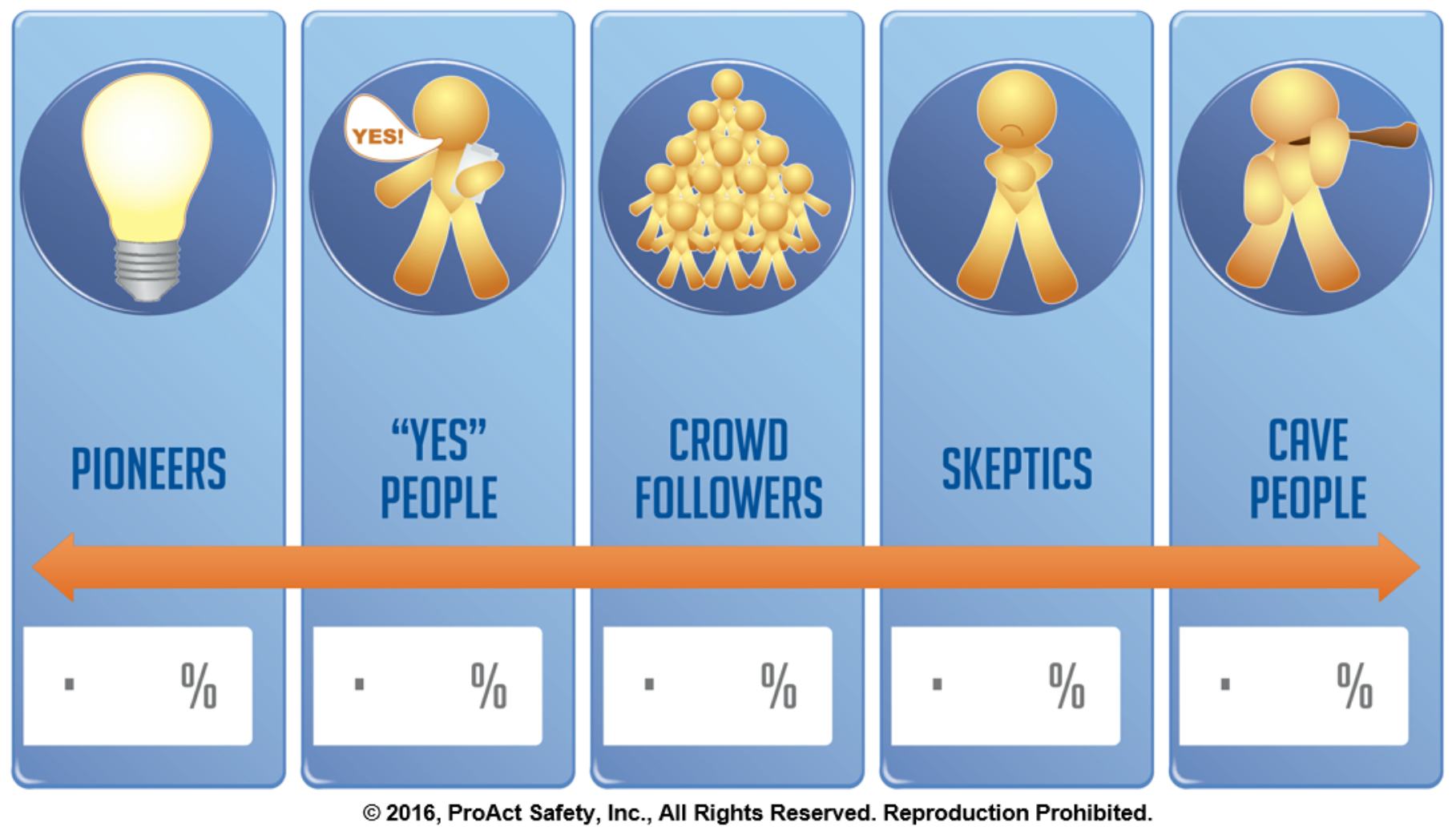Occupational Health & Safetey - January 2017
By: Shawn M. Galloway
Printable Version
Knowing the five types of people that exist throughout your company will be the differentiator with your next organizational change effort. In most businesses today, change is the only constant, and not everyone adapts well.
Japanese scholar, Okakura Kakuzō, believed, "The art of life is a constant readjustment to our surroundings." Some people behave as though they appreciate that perspective. Others are quite content living in the rut that has become all too familiar. After leading countless organizational change efforts in entities of all shapes and sizes, experience shows that change, especially culture change, happens best from within.
The model below, Five Types of People in Organizational Change™, has been successfully used both with pilot projects and team-based top-down, middle-out and bottom-up initiatives to help categorize where people are, when and how best to involve them, or the decision not to involve them. Keep in mind people will fit in different groups depending on the type and target of change.

Figure: Five Types of People in Organizational Change™
- Pioneers — These are the individuals that like and embrace new things or initiatives. They are either the first in line or the first seeking out further information with keen interest.
- "Yes" People — These are individuals when asked to be a part of something by their boss, they feel obligated to do it. They might not be the first in line to volunteer, but they almost never refuse.
- Crowd Followers — These are individuals who tend to take a wait-and-see approach. When it is obvious something new is happening and adding value, they want to be involved and on the winning side, once it is clear which side is winning.
- Skeptics — These are individuals who trust data and have a low opinion of opinions. No amount of hype or popularity will convince them, but once they have come to the conclusion this is the way to go, become strong advocates and valuable allies. Most good skeptics have a following of people who admire their analytical skills and value their conclusions. Winning over a skeptic often also means winning over their followers.
- CAVE People — CAVE is an acronym for Citizens Against Virtually Everything. These individuals won't join and don't care if you succeed. They just want to collect their paycheck and go home. CAVE People are often the result of an abundance of programs implemented that either didn't add value or, from their point of view, did more harm. Unless you have the power to remove them from your organization, they will need to be part of the change considerations. An organizational change strategy starts at the right place, obtains quick wins and builds momentum toward the goals. Do not start with CAVE People. They might be influential and, by directly targeting them, a faction could be created to oppose your initiative. Understand their point of view, as you'll need to disarm and sometimes discredit them if they work against the needed direction.
Ideally, begin with influential Pioneers who already want to be involved. When more are needed, approach the "Yes" People for their commitment. Shortly after, the Crowd Followers will begin to recognize the momentum, demonstrate interest and join the cause. Once results become visible and Skeptics have completed their painful analysis, determining the initiative makes sense and deserves their help, they will join as will their followers.
Now, it is EVERYONE against the CAVE People. Is it time for an all-out attack? NO! You don't win over CAVE People and you don't do battle with those who have nothing to lose. Almost no initiative wins over 100% of the organizational population. The vast majority is enough for success. Where do the people in your organization fit and how can they best be leveraged for your next successful change initiative?

Shawn Galloway, CEO of ProAct Safety, is an expert in safety excellence. With almost thirty years of experience, he is a highly sought-after advisor, keynote speaker, and expert witness. Shawn has become a trusted partner to leading organizations across various industries worldwide. He ranks in the top 1% of the most prolific writers in his field, having authored over 500 articles and several bestselling books. He also launched the world's first safety podcast, Safety Culture Excellence©. As a recognized authority in safety, Shawn has received awards such as being named among the Top 50 People Who Most Influence EHS and a Top 10 Speaker, among others.
He is a regular guest on Bloomberg, Fox News, The Daily Mail, Dubai One, U.S. News & World Report, Sirius Business Radio, Wharton Business Daily, and leading safety magazines and podcasts. Shawn also serves as a member of the Harvard Business Review Advisory Council, Forbes Business Council, and Fast Company Executive Board, enabling his influence to shape safety thinking and strategy at the executive level.
